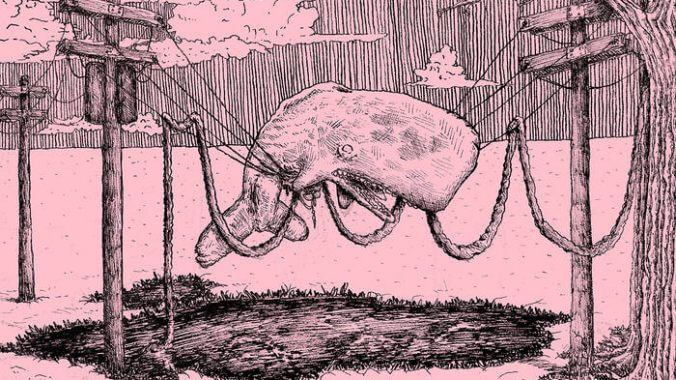Home Is Where Chart New Seas on the whaler
The Florida emo breakouts expand their songwriting on the restlessness and endurance of daily life on their sophomore record

Around the time Florida emo quartet Home Is Where released their debut LP i became birds in 2021, it became nearly impossible to read about daily COVID death tolls without coming across comparisons to 9/11. The shorthand was obvious: how do people become so numb to mass death that they shrug it off daily in a pandemic while memorializing the deaths on 9/11 for decades? That question also extends to any crisis where many look the other way, whether it’s the increasing creep of environmental decay, the endangerment and extinction of animals crucial to the global ecosystem or the tacit attempts at genocide of trans individuals for simply trying to live their lives. The longer these threats persist, the more destruction becomes second nature, so prevalent that, for some, it becomes background noise.
Frontwoman Brandon MacDonald turns this constant peril into anything but an afterthought with a repeated scream: “everyday feels like 9/11.” The cry pierces the midpoint of the whaler, Home Is Where’s ambitiously self-proclaimed “concept record about getting used to things getting worse,” but MacDonald’s performance argues that adjustment doesn’t equal complacency. It rattles the relative quiet surrounding either side of “everyday feels like 9/11,” like a moment of sudden lucidity about all the bullshit endured before the first wail erupts.
This is where the whaler thrives: feeding off of the same ceaselessly roiling possibility that made i became birds more than just another fifth wave emo debut. That LP managed to pack something new into each track in its lithe 18 minute runtime; the band’s sophomore record pushes even further, the scope of its sound never feeling confined. On the whaler, Home Is Where can be post-hardcore maniacs on “everyday feels like 9/11,” before quickly switching gears to the alt-country pedal steel of “daytona 500.” But it’s MacDonald’s commanding howls and yelps, alongside her jagged lyricism, that anchor each maneuver, complemented by guitarist Tilley Komorny’s fluid shifts in accentuating every disparate narrative.
The most obvious point of comparison is Neutral Milk Hotel, an analogue the band frequently invoked themselves. The most blatant parallels all but invite themselves—the ways electricity flows through MacDonald’s idiosyncratic vocal performances like Jeff Mangum’s, how 9/11 is to the whaler as Anne Frank was to In The Aeroplane Over The Sea, the addition of a singing saw to the band’s instrumental palette—but Home Is Where derives just as much impact in the visceral, often uncomfortable imagery that Mangum had a knack for finding unexpected beauty in. Echoes of the repression and the search for some deeper place of cosmic belonging linger in the sexual disillusionment of “yes! yes! a thousand times yes!” or the imagined elder years of “nursing home riot.”
-

-

-

-

-

-

-

-

-

-

-

-

-

-

-

-

-

-

-

-

-

-

-

-

-

-

-

-

-

-

-

-

-

-

-

-

-

-

-

-








































